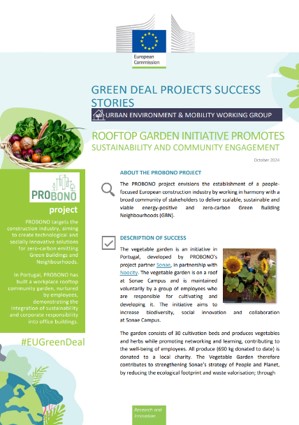About the project
The PROBONO project envisions the establishment of a people-focused European construction industry, by working in harmony with the broader community of stakeholders, to deliver scalable, sustainable, and viable energy-positive and zero-carbon Green Building Neighbourhoods (GBNs). See here for more information.
Description of success
The vegetable garden is an initiative developed by PROBONO project partner, SONAE, in partnership with Noocity as a part of the PROBONO H2020 project. The initiative aims to increase biodiversity, social innovation and collaboration at Sonae Campus.
The vegetable garden is installed on the roof of one of the logistics warehouses of Sonae Campus and is maintained by a group of employees who, on a voluntary basis, are responsible for cultivating, maintaining, and developing the vegetable garden. The Garden consists of 30 cultivation beds and produces vegetables and herbs while promoting networking and learning, and contributing to the well-being of employees. All produce is donated to a local charity, with more than 690 kg donated to date. The vegetable garden contributes to strengthening Sonae’s strategy of People and Planet, namely in terms of Sustainability, with the reduction of the ecological footprint and waste valorisation, Corporate Responsibility, through food donation to the local community, and People Valuation and work-life balance, contributing to the personal fulfilment of employees through volunteering.
Highlights
Social impact through the project’s vegetable garden, 690+ kg of produce donated to the local community.
Environmental impact where the project has saved 110,880 litters of water, consumed 1386 kg of CO₂ and reused 340 kg of organic waste.
Employee engagement as the vegetable garden was maintained voluntarily by employees, fostering teamwork and personal fulfilment.
Corporate responsibility as the project aligns with Sonae's strategic goals and demonstrates commitment to sustainability and community.
Quantifiable results where the project has provided clear metrics regarding the produce donated, water saved, CO₂ consumed and waste reused.
Outputs
The PROBONO project is developing systems to improve recycling and reduce CO₂ consumption. It has achieved the following:
Cultivated produce: The initiative produces vegetables and herbs through the cultivation beds installed on the roof of one of the logistics warehouses at Sonae Campus.
Donated to the Social Solidarity Institution: All the vegetables and herbs produced are donated to a local social solidarity institution, contributing to addressing food insecurity in the community.
Saved water: A total of 110,880 litres of water was saved through efficient watering practices in the vegetable garden.
Reduced CO₂ consumption: The plants grown in the vegetable garden consume a total of 1386 kg of CO₂, contributing to reducing carbon emissions and mitigating climate change.
Reused organic waste: Approximately 340 kg of organic waste from restaurants is reused in the vermicomposting process, demonstrating effective waste valorisation and resource utilisation.
Impact
The vegetable garden has had a positive social impact, providing fresh produce to the local community. PROBONO’s initiative has also had a significant environmental impact, saving water, reducing CO₂ emissions, and reusing organic waste. Employees have been engaged by fostering teamwork and personal fulfilment in the workplace through volunteering. At the same time, Sonae’s dedication to corporate responsibility has been showcased through aligning with sustainability goals and demonstrating commitment to social responsibility.
Overall, the vegetable garden initiative exemplifies how businesses can implement sustainable practices, foster social innovation and engage employees in meaningful activities, ultimately leading to positive outcomes for both the company and the broader community.
Lessons
Strategic integration: the project shows the importance of embedding sustainability goals into the core business strategy to ensure alignment with organisational values and objectives.
Employee engagement: the project shows the importance of engaging employees through voluntary activities that contribute to social and environmental causes, fostering a sense of belonging and fulfilment.
Partnership benefits: the project shows the relevance of collaborating with external partners to leverage expertise and resources, enhancing the impact and reach of sustainability initiatives.
Measurable impact: the project shows the significance of quantifying the impact of initiatives with clear metrics, enabling evaluation of success and effective communication of results to stakeholders.
Continuous improvement: the project shows the relevance of continuously evaluating and improving initiatives based on feedback and performance metrics to optimise outcomes over time.

Figure 1: Rooftop vegetable garden at the Horta Sonae Campus. ©PROBONO 2024

Figure 2: Rooftop vegetable garden at the Horta Sonae Campus. ©PROBONO 2024

